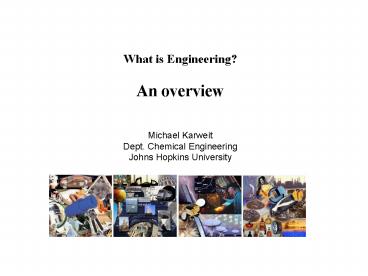What is Engineering - PowerPoint PPT Presentation
1 / 15
Title:
What is Engineering
Description:
What is Engineering? An overview. Michael Karweit. Dept. Chemical Engineering. Johns Hopkins University ... Engineering is 'the application of mathematical and ... – PowerPoint PPT presentation
Number of Views:22
Avg rating:3.0/5.0
Title: What is Engineering
1
What is Engineering? An overview Michael
Karweit Dept. Chemical Engineering Johns Hopkins
University
2
What is Engineering?
According to Websters II New Riverside
Dictionary Engineering is the application of
mathematical and scientific principles to
practical ends, as the design, construction, and
operation of economical and efficient structures,
equipment, and systems. But is there more. .
.?
3
Engineering is art. Aesthetics as well as
function counts
The Guggenheim Museum, Bilbao, Spain Frank Gehry,
architect
The Ironbridge, Coalbrookdale, England 1779
4
More art . . .
Pont du Gard, France, 100AD
Maillart bridge, Switzerland
5
Engineering is approximation. The mathematics of
engineering systems are often too complicated to
solve analytically.
6
Engineering is measurement and estimation. River
flow, noise in a communication system, scatter in
a laser beam, earthquake characteristics--all
require measurement
7
Engineering is modeling and simulation. Often
the only efficient means to confirm that an idea
or design will work is to experiment with a
scale model or computer simulation.
Model of the X-33 being tested in the NASA
Langley Mach 20 helium wind tunnel
8
Engineering is communication. Making
presentations, producing technical manuals,
coordinating teams for large scale projects are
all fundamental to engineering practice.
Richard Feynman during the Challenger disaster
hearings.
125M communication error
9
Engineering is politics. The best functional
solution is not necessarily the best practical
solution.
Three-mile island
NIMBY
Alaskan pipeline
10
Engineering is finance. Design, construction,
operation, and maintenance costs determine the
viability of projects.
The Big Dig Bostons 14.2 billion construction
project
11
Engineering is invention. New devices,
materials, and processes are developed by
engineers to meet needs that existing
technologies do not address.
12
Engineering is ethics. Engineering is
safety. Engineering is public service. .
. . This list is not exhaustive, but it does
suggest a far broader scope than Websters II
definition
13
What is Engineering? The course.
From a substantive point of view 1)
Strength/behavior of materials 2)
Statics/structures 3) Uncertainty, statistics,
measurment 4) Robotics 5) Digital
logic/circuitry 6) Separation processes 7)
Diffusion, heat transfer
14
From a process point of view, i.e., what an
engineer does 1) Communication a) proposal
presentation b) development of
assembly/construction plans c) reporting and
interpreting of laboratory results d) research
synthesis (written) 2) Project management a)
time/team management b) design c)
construction d) testing
15
process (cont.) 3) Experimentation a)
measurement b) application of principles c)
application of data 4) Tools a)
approximation b) statistics c) computer
software i) simulation ii)
spreadsheet/presentation iii)
graphics/drawing































